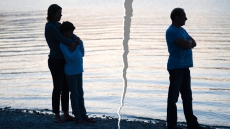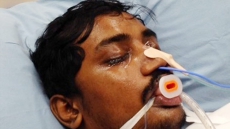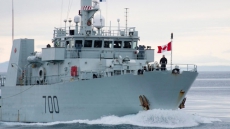SCHLOSS ELMAU, Germany — Prime Minister Stephen Harper arrived at the G7 summit Sunday where he will face discussions on a topic he has been repeatedly criticized for not doing enough about — climate change.
Germany, with the firm backing of neighbour France, is linking climate change to global security following a report prepared for G7 foreign ministers in April that urged all countries to place climate change at the heart of their foreign policy.
"Climate change is the ultimate threat multiplier: it will aggravate already fragile situations and may contribute to social upheaval and even violent conflict," said the report by the European Union Institute for Security Studies.
That characterization has some observers wondering whether it might make climate change more appealing to Harper because it aligns with his robust foreign policy outlook, which sees Canada taking a leading role in helping the world fight security threats.
Climate security has been on the international radar for several years, with the U.S. Pentagon and the British military issuing major studies about the security risks posed by extreme climate events.
The assessments say drought, flooding, massive storms and famines could cause widespread displacement of populations and food shortages, sparking wars and conflict.
"Obviously it is a threat," said one G7 government official, speaking on condition of anonymity because they weren't authorized to discuss the matter publicly.
"In the worst-case scenario, we will have all kinds of conflict because of climate change."
A senior French foreign ministry official said Foreign Minister Laurent Fabius is seized with the issue of climate security, and is pushing it hard in the run-up to the G7 and the major UN climate change meeting in Paris in December.
"Whether in the G7 or other fora, Minister Fabius ... is strongly convinced that security issues — as a matter of consequence, peace — are closely linked to this question of climate change," said the official, who also spoke on condition they not be named.
Foreign Affairs Minister Rob Nicholson, who was at the table with his G7 counterparts in April, acknowledged the report, saying Canada takes climate change seriously and pointing to the government's recent greenhouse gas reduction targets.
"It can have an effect on just about every level," Nicholson said in a recent interview.
"We see changes taking place in the Arctic, for instance, and so we know first-hand the effects of climate change in this country, and so we take that understanding with us every time we sit down with our colleagues."
Germany and France want the G7 leaders' summit to provide some momentum for the Paris conference in December.
"Canada supports efforts to conclude a fair and effective global agreement on climate change," Harper's office said in a statement.
But German Chancellor Angela Merkel was more emphatic in a Globe and Mail column aimed at Canadian readers this past week: "The G7 ought to be a model for the necessary transition to a low-carbon economy."
Merkel wants countries to commit to the Green Climate Fund, which is aiming for $100 billion by 2020. Germany recently doubled its contribution to $8 billion while Merkel has personally called on all industrial countries contribute.
Merkel and Harper are to meet later Sunday in at the picturesque mountain summit site after an afternoon of formal meetings.
Tad Homer-Dixon, the author and climate specialist at the Balsillie School of International Affairs in Waterloo, Ont., said climate change will make the world a more violent place by 2030 to 2040, so the Conservative government's indifference has dire implications.
"I expect, given the trajectory we're on, that the world is going to be an extraordinarily violent place in the middle of this century," he said, citing droughts as a contributing factor to the carnage in Syria and parts of Africa.
The Conservatives may wish the climate discussion "would just go away," but the new security dimension could draw them towards it, said Homer-Dixon.
"Once people on the right recognize the national security implications of environmental stress, then maybe they'll start to take these issues seriously."
Last week, a report co-authored by former United Nations secretary general Kofi Annan accused Canada of being a laggard on climate change and the government's chief climate negotiator fielded skeptical questions about Canada's greenhouse-gas reduction policies at a UN climate conference in Bonn.
Five things about Prime Minister Stephen Harper at the G7 summit in Germany

SCHLOSS ELMAU, Germany — Here are five things to know about the G7 leaders' summit that Prime Minister Stephen Harper will be attending Sunday and Monday in Germany.
1. Harper's host, German Chancellor Angela Merkel, is placing the fight against climate change at the top of her sweeping agenda. Merkel, with the help of France, wants to push the idea of a pledge to reach zero carbon emissions. But Canada and Japan are viewed as holdouts. The German leader also wants to highlight health crises like the Ebola outbreak in West Africa, growing the global economy, fostering trade, international development and empowering women in business.
2. Harper's office says the G7 will focus on the global economy, development and key foreign policy security challenges, including Russia's aggression in Ukraine and the ongoing threat posed by Islamic militants in Syria and Iraq. It also says the leaders will look at ways to support the international climate change conference being hosted by France in December, and that Harper will push the leaders to talk about maternal, newborn and child health, his signature foreign aid initiative.
3. Merkel is the longest-serving G7 leader, and is one of the world's most powerful politicians. Harper has been serving the second-longest. Merkel, Harper and Japanese Prime Minister Shinzo Abe were all at the last G7 in Germany in 2007. Harper's first trip to what was then the G8 was in the summer of 2006, where he met Russian President Vladimir Putin for the first time in his hometown of St. Petersburg. Harper said this week he doesn't want to see Putin back in a reconstituted G8.
4. The leaders of Canada, Germany, the United States, Britain, France, Italy and Japan will be meeting at the secluded Schloss Elmau resort hotel in the foot of the Bavarian Alps, 100 kilometres south of Munich. The setting is in keeping with the growing practice of isolating G7 leaders from protesters. As was the case when




